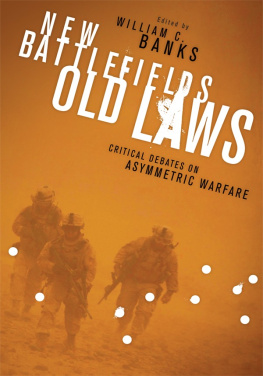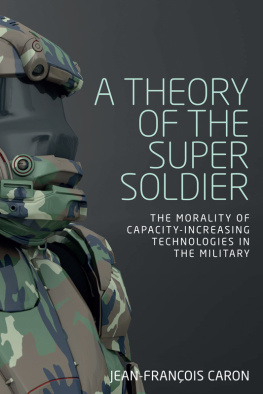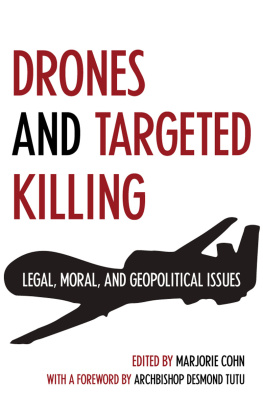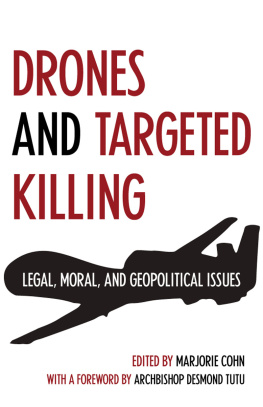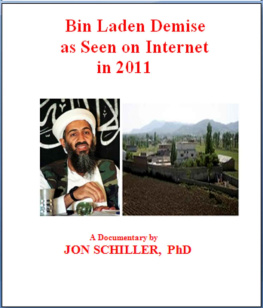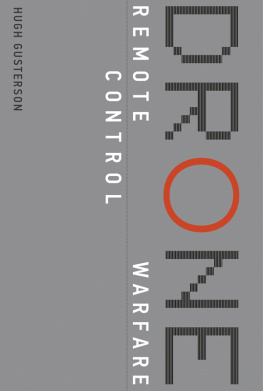TARGETED KILLINGS
TARGETED KILLINGS
Law and Morality in an Asymmetrical World
Edited by
CLAIRE FINKELSTEIN
JENS DAVID OHLIN
ANDREW ALTMAN


Great Clarendon Street, Oxford OX2 6DP
United Kingdom
Oxford University Press is a department of the University of Oxford.
It furthers the Universitys objective of excellence in research, scholarship,
and education by publishing worldwide. Oxford is a registered trade mark of
Oxford University Press in the UK and in certain other countries
The several contributors, 2012
The moral rights of the authors have been asserted
First Edition published 2012
Impression: 1
All rights reserved. No part of this publication may be reproduced, stored in a retrieval system, or transmitted, in any form or by any means, without the prior permission in writing of Oxford University Press, or as expressly permitted by law, by licence or under terms agreed with the appropriate reprographics rights organization. Enquiries concerning reproduction outside the scope of the above should be sent to the Rights Department, Oxford University Press, at the address above
You must not circulate this book in any other form and you must impose the same condition on any acquirer
Crown copyright material is reproduced under Class Licence Number C01P0000148 with the permission of OPSI and the Queens Printer for Scotland
British Library Cataloguing in Publication Data
Data available
Library of Congress Cataloguing in Publication Data
Data available
ISBN 9780199646470
9780199646487 (pbk.)
Printed in Great Britain
on acid-free paper by
CPI Group (UK) Ltd, Croydon, CR0 4YY
Links to third party websites are provided by Oxford in good faith and for information only. Oxford disclaims any responsibility for the materials contained in any third party website referenced in this work.
PREFACE
The law of armed conflict has traditionally been organized around the symmetry of rules of conduct: the idea that the permissions and restrictions that govern the soldiers of one side in war are the same as for the other side, regardless of the justice of each partys causus belli. Thus a German and an American soldier during the Second World War have an equal right to kill one another, regardless of the moral justification for the belligerency of their respective countries. Modern warfare, however, is fundamentally asymmetrical. Instead of the traditional reciprocal form of combat, where members of sovereign states fight co-belligerents from other states, we now have a war between traditional forces of a sovereign power, on the one hand, with what might be thought of as a band of civilian outlaws, namely individuals whose aggressive designs are enacted through membership of a criminal organization instead of the military forces of a sovereign state. Thus while co-equal sovereigntyon which the ius in bello is premisedis symmetrical, the principles of the War on Terror are necessarily asymmetrical: we regard it as permissible to target members of Al-Qaeda, for example, but we do not accept their right to target us. Similarly, although we regard members of Al-Qaeda as permissible targets, we regard them as exempt from the protections traditionally extended to ordinary enemy combatants, such as prisoner of war status and, according to some, the right of repatriation upon the conclusion of hostilities. The asymmetrical nature of the War on Terror is captured by the concept of the unlawful combatant.
The pressures of modern warfare are nowhere more visibly displayed than in the policy surrounding the Obama Administrations use of targeted killing, otherwise known as kill or capture raids on individuals on the JPEL (Joint Prioritized Effects List). While there has been a steady increase in reliance on targeted killing as a technique of war, the willingness on the part of the Obama Administration to subject the new policy to the legal and moral examination it appears to warrant has not kept pace. Yet the expanded conception of combatant status, reflected in the unlawful combatant category, depends heavily on the asymmetrical logic that the traditional law of war rejects. The most crucial question for the modern theory of war, then, is whether the transformation from symmetrical to asymmetrical conceptions of military engagement is ethically and legally defensible. Should we see the concept of unlawful combatants, and all that this view expresses, as a justifiable adaptation to the realities of modern warfare? Or should we see it as a corruption of the values of reciprocity that have for many years formed the moral core of permissible aggression in war? This is one of the most important questions the essays in this volume attempt to answer.
A second question raised by the asymmetry of modern warfare is about the line between law-enforcement and military action. Traditionally, even highly organized aggressive action on the part of civilians has fallen within the domain of law enforcement: if members of Al-Qaeda are civilians, then the correct approach to handling the threat they pose would be based on law-enforcement techniques and authority. Thus, comparable to the War on Drugs, the War on Terror might be handled under the auspices of international and coordinated domesticated police action. Once again, however, if we think of enforcement efforts against international terrorists as properly falling within the domain of law-enforcement, we should also see terror suspects as entitled to the guarantees of domestic criminals, according to which rules of evidence prohibit the use of coercive interrogation techniques and the accused has a right to a fair trial and to competent legal representation. On this view, limitations on the use of preemptive force would in all likelihood render kill or capture raids morally and legally impermissible. One can frame these important questions another way: if we are correct in thinking of terrorists as engaging in military attacks on the United States, in keeping with a reconceived view of war as asymmetrical, then what is to restrict our taking such a view of the appropriateness of military conduct in fighting terrorists on United States soil? Insofar as the targeted killing of Al-Awlaki, an American citizen, can be justified under the Law of Armed Conflict, could we not extend such justification to a comparable killing of a suspected terrorist in the United States? And if so, why not extend such treatment to key players in the War on Drugs? In what does the difference between law enforcement and military action now consist?
None of these gripping questions were present in my mind in the fall of 2010, as I rounded up the list of usual suspects, searching for one that would suit for the spring conference of the Institute for Law and Philosophy (ILP). Around that time, I happened to attend a conference, jointly organized between West Point and Columbia Law School, on War and the Rule of Law. There I encountered a number of experts in military law, several of whom were active in the Judge Advocate General Corps, and others of whom had been in active duty and who were now turning to more academic pursuits. Among the topics they discussed was the permissible use of targeted killing. Much to my amazement, these experts turned out to disagree on key issues with one another. We are, of course, all accustomed to the disagreements of high theory: while they can be pointed, and at times downright aggressive, we sometimes comfort ourselves with the thought that many such academic debates will always remain just that, exercises in high theory that rarely, if ever, make a difference to the real world. But debates about the permissible use of military force?! Here disagreement was unnerving. How could those responsible in the Department of Defense and the State Department fashion military policy if the foundations of that policy were
Next page


